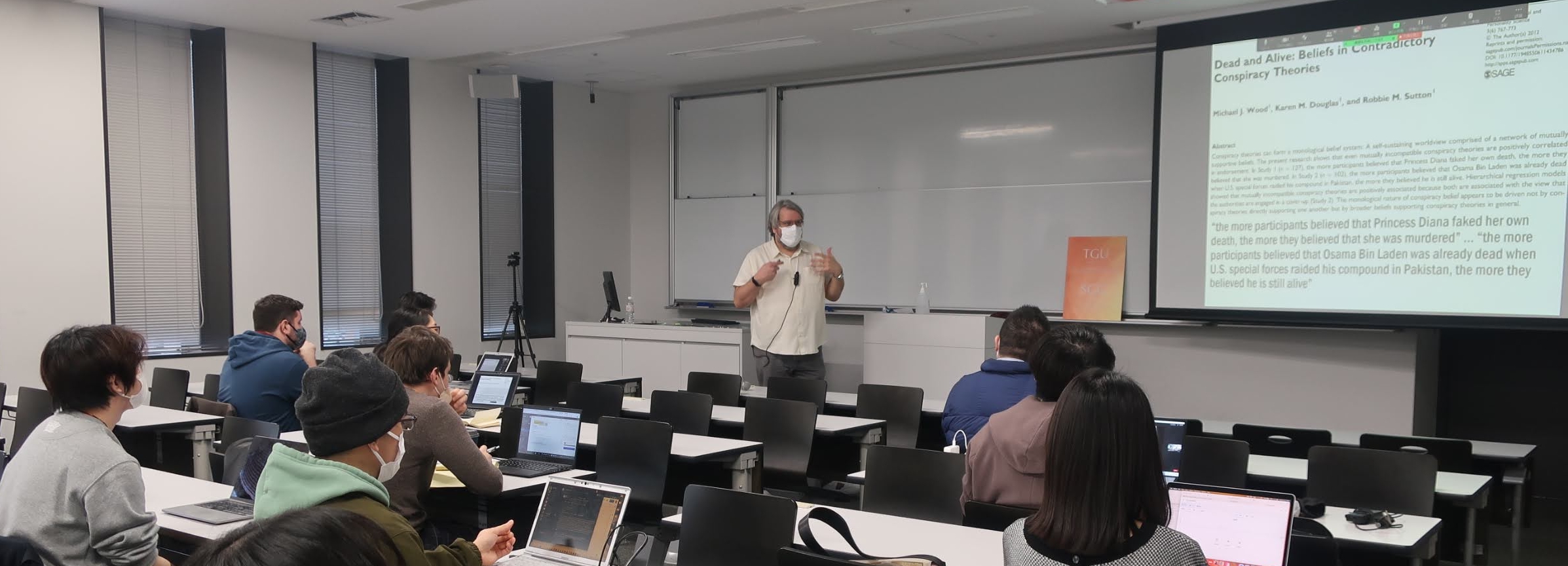It was a great honor to invite Professor Levente Littvay as a lecturer of this workshop series, which was held in person for Waseda students in January 2023.
Professor Levente Littvay has published numerous research papers on populism and conspiracy theories through the analysis of polling data. Not limited to these fields, he has also made significant contributions to the development of methodology in the social sciences. Among his prominent works, he has been keen to methodological education. After serving as Academic Convenors (2015-2021) of the European Consortium for Political Research (ECPR) Methods Schools, he founded MethodsNET. His workshop series consisted of three parts:(1) Advanced Regression, (2) Multilevel Modeling, and (3) Structural Equation Modeling. He provided participants with the opportunity to develop their data analysis skills needed in the social sciences.
Furthermore, his special Seminar titled “Conspiracy Beliefs, Politics, and the COVID-19 Pandemic” was held on his last day at Waseda. He summarized his original research on the connection of conspiratorial thinking and both populist attitudes and violence from pre-COVID data collections and presented initial exploration of the European Social Survey.
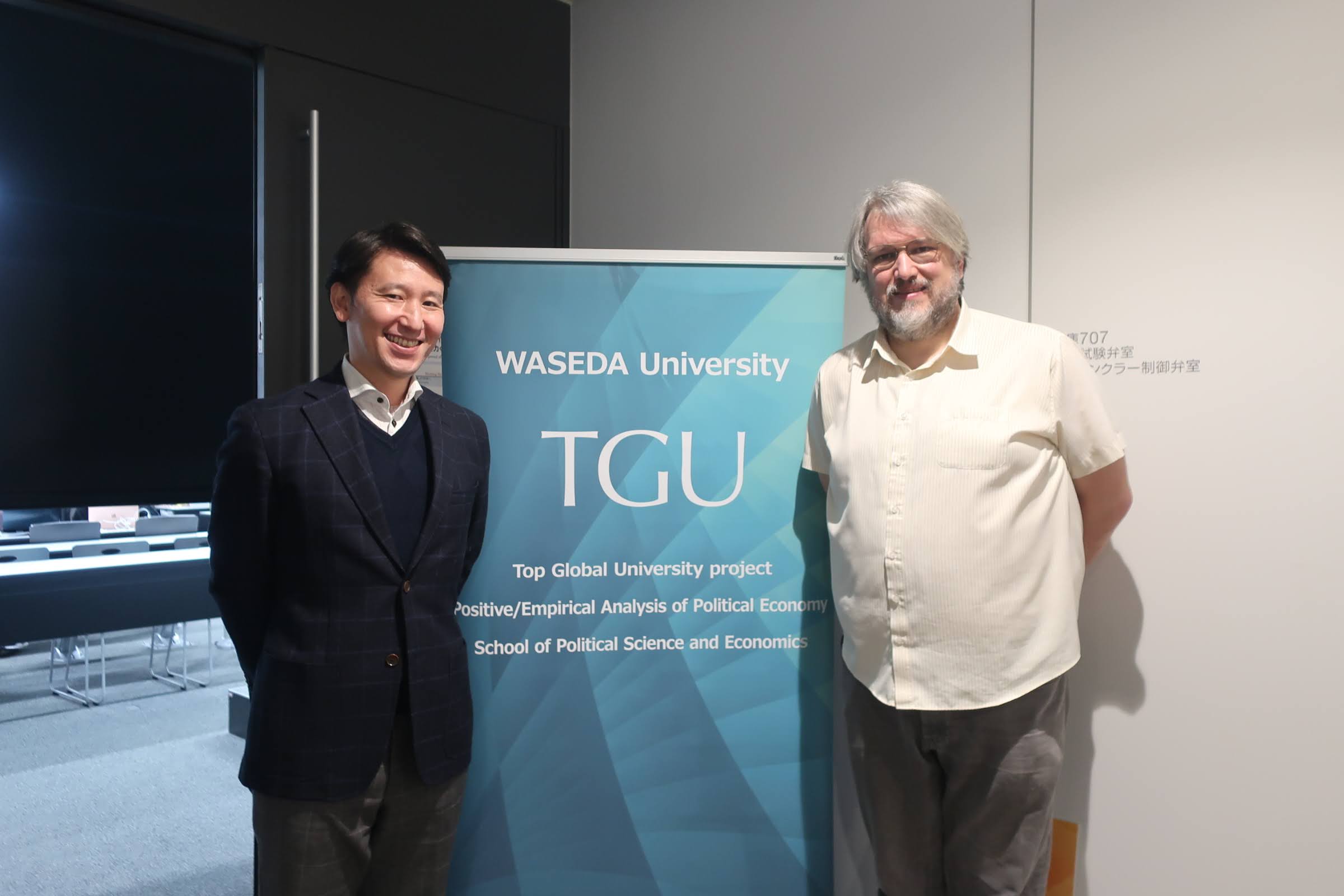
Host Professor Airo Hino, Faculty of Political Science and Economics and Professor Levente Littvay, Central European University
Professor Hino Researcher’s data base
Student’s Reports on the Workshop series and Seminar
CHAI, Peter (Siyuan)
Graduate School of Political Science M2
Areas: Comparative Politics, Political Sociology, Public Opinion
Report on “Advanced Regression”
The first workshop titled “Advanced Regression” discusses various assumptions, problems, and complexities associated with the OLS regression model, which is often considered fundamental to today’s quantitative social science research. Prof. Levente Littvay starts with a theoretical review of the regression formula and then outlines the assumptions behind the model such as full model specification or no omitted variables bias, continuity or interval measures without measurement errors, and homoscedasticity or constant variable variance, no collinearity, and no outliers. He constantly engages the workshop participants to ask and answer questions and encourages comments and contributions, and this allows us to consider a range of challenges and considerations we may be have in applying regression models and interpreting regression results in actual research, such as operationalization, variable intervals, variance inflation factors, clustering, multilevel modeling, sampling weights, link functions, logit and probit, maximum likelihood estimation, and time-series and panel data analyses.
Prof. Littvay concisely explains each assumption behind the regression model with graphs and functions on the whiteboard, brings up many relevant examples involved in cross-sectional survey, public opinion, and voting behavior research, demonstrates many case studies and R codes on the screen, and summarizes some statistical concepts that are instrumental for understanding regression. Through participating in the lively interactions throughout this workshop and listening to his practical suggestions on paper writing, we are encouraged to assess the quality of the studies we read with the help of our empirical instinct and judgment, I am reminded not to blindly employ the regression model without giving enough thought to research design and methodology such as the data structures, variable types, measurement tools, and model fits, and I feel the need to reflect again upon the limitations and flaws of how I have understood and analyzed the response items of the survey datasets I use in my master’s thesis as well as some potential improvements that I can make. For example, I should consider the spatial difference in the distances between the response items such as those in the Likert Scale, e.g., “Strongly Agree,” “Agree,” “Disagree,” “Strongly Disagree” and the inter-person differences in such distances and in understanding these multiple choices. Moreover, I should be aware of sample errors and bias in the survey datasets and the necessity for sample weighting.
Report on “Conspiracy Beliefs, Politics, and the COVID-19 Pandemic”
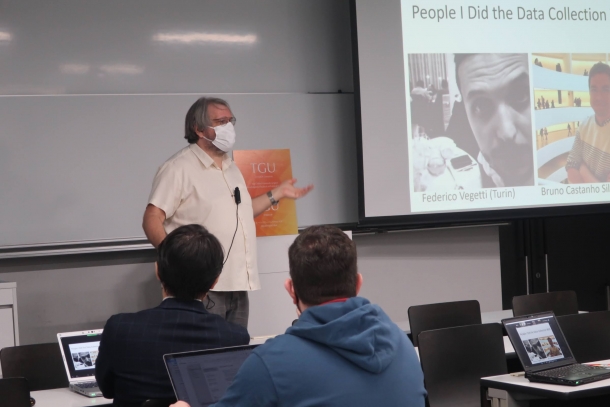
The guest seminar given by Prof. Levente Littvay titled “Conspiracy Beliefs, Politics, and the COVID-19 Pandemic” introduced us to his original research on conspiracy theories through the use of the European Social Survey. He started his presentation by giving us a short overview of the history of conspiracy theories, and he explained why conspiratorial thinking is worth investigating as a part of public opinion and survey research in political sociology and how it carries academic significance in the recent political landscape, considering its potential connections with pandemic-related attitudes and political thinking such as populist sentiments. Through explaining his theory building and hypotheses and presenting his preliminary statistical results, Prof. Littvay actually made a conversation between his own studies on conspiracy theories and some of the key concepts and precautions pertaining to survey design and analysis which he previously taught us in the “Advanced Quantitative Methods in Social Sciences” workshop series along the way.
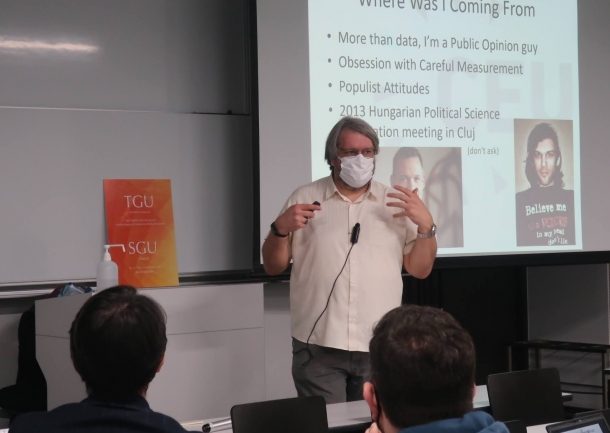 This presentation not only made a convincing case on why conspiratorial thinking should be studied and how some components in the European Social Survey can be used to achieve this purpose but also gave me some insights on how I can in fact incorporate some discussions regarding conspiratorial thinking in my own comparative studies on postmaterialist and authoritarian values in East Asia. How do various indices such as libertarian, authoritarian, materialist, postmaterialist, populist, and conspiratorial values relate to each other empirically and statistical as well as and theoretically and spatially, how do economic and demographic variables associate with these values, and to what extent some survey items about how people think on a daily basis such as inside family, in school, and at the workplace such as childrearing values can “predict” political tendencies and behaviors can be very interesting topics to explore beyond Europe and the U.S. and in East Asia. I believe that these interesting questions raise plentiful research opportunities for longitudinal studies with the help of future waves of different survey projects that do include questions on conspiratorial attitudes, for cross-sectional studies between some East Asian societies such as Japan, South Korea, and Taiwan, and for understanding the underlying “motives” behind some authoritarian and populist as well as postmaterialist and New Left movements.
This presentation not only made a convincing case on why conspiratorial thinking should be studied and how some components in the European Social Survey can be used to achieve this purpose but also gave me some insights on how I can in fact incorporate some discussions regarding conspiratorial thinking in my own comparative studies on postmaterialist and authoritarian values in East Asia. How do various indices such as libertarian, authoritarian, materialist, postmaterialist, populist, and conspiratorial values relate to each other empirically and statistical as well as and theoretically and spatially, how do economic and demographic variables associate with these values, and to what extent some survey items about how people think on a daily basis such as inside family, in school, and at the workplace such as childrearing values can “predict” political tendencies and behaviors can be very interesting topics to explore beyond Europe and the U.S. and in East Asia. I believe that these interesting questions raise plentiful research opportunities for longitudinal studies with the help of future waves of different survey projects that do include questions on conspiratorial attitudes, for cross-sectional studies between some East Asian societies such as Japan, South Korea, and Taiwan, and for understanding the underlying “motives” behind some authoritarian and populist as well as postmaterialist and New Left movements.
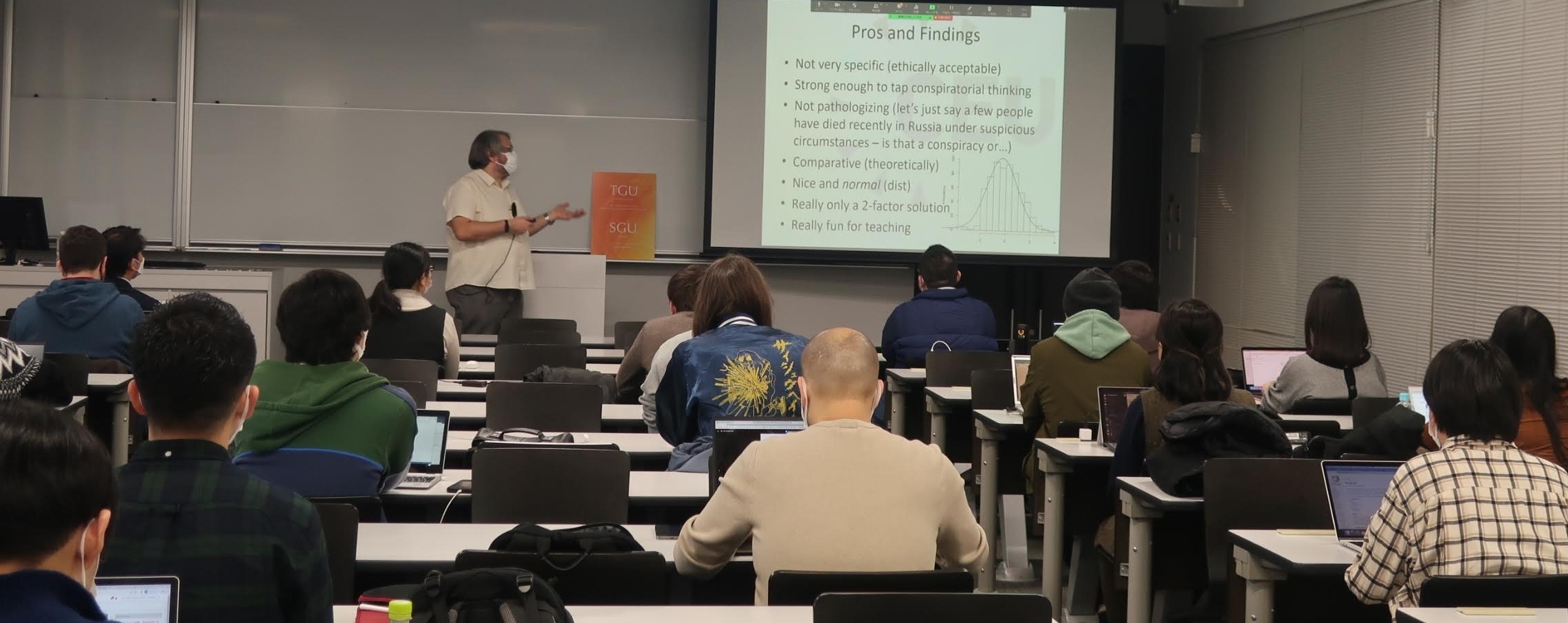
Please refer to the corresponding Japanese event report for a student report by Hikaru Nukui here (available in Japanese only.)
